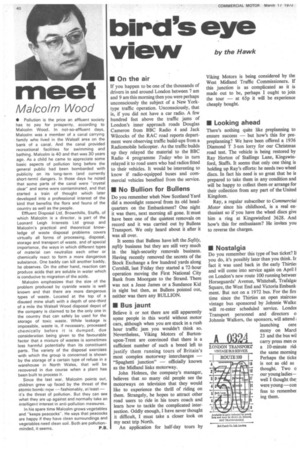meet
Page 42

If you've noticed an error in this article please click here to report it so we can fix it.
Malcolm Wood
• Pollution is the price an affluent society has to pay for prosperity, according to Malcolm Wood. In not-so-affluent days, Malcolm was a member of a canal carrying family who lived in the Walsall area on the bank of a canal. And the canal provided recreational facilities for swimming and bathing. Malcolm is 40 and that was 30 years ago. As a child he came to appreciate some basic aspects of pollution long before the general public had been bombarded with publicity on its long-term (and currently short-term) dangers. In those days he noted that some parts of the canal were "crystal clear" and some were contaminated, and that started a train of thought which later developed into a professional interest of the kind that benefits the flora and fauna of the country as well as the people.
Effluent Disposal Ltd, Brownhills, Staffs, of which Malcolm is a director, is part of the Leonard Leigh Interests Ltd group and Malcolm's practical and theoretical knowledge of waste disposal problems covers virtually all forms of processing, disposal, storage and transport of waste, and of special importance, the ways in which different types of material can neutralize each other or chemically react to form a more dangerous substance. One baddy can kill another baddy, he observes. On the other hand, reaction can produce acids that are soluble in water which is conducive to migration of the acids.
Malcolm emphasizes that the size of the problem produced by cyanide waste is well known and that there are more dangerous types of waste. Located at the top of a disused mine shaft with a depth of one-third of a mile the Walsall Wood disposal depot of the company is claimed to be the only one in the country that can safely be used for the storage of toxic waste. While leakage is impossible, waste is, if necessary, processed chemically before it is dumped, due consideration being given to the favourable factor that a mixture of wastes is sometimes less harmful potentially than its constituent parts. The variety of the disposal exercises with which the group is concerned is shown by the storage of a certain type of refuse in a warehouse in North Wales, that will be recovered in due course when a plant has been built to process it.
Since the last war, Malcolm points out, children grew up faced by the threat of the atomic bomb: now —fashionably, at least — it's the threat of pollution. But they can see what they are up against and normally take an intelligent interest in anti-pollution measures.
In his spare time Malcolm grows vegetables and "keeps peacocks". He says that peacocks are happy if they have clean surroundings and vegetables need clean soil. Both are pollution minded, it seems. P.B.










































































































